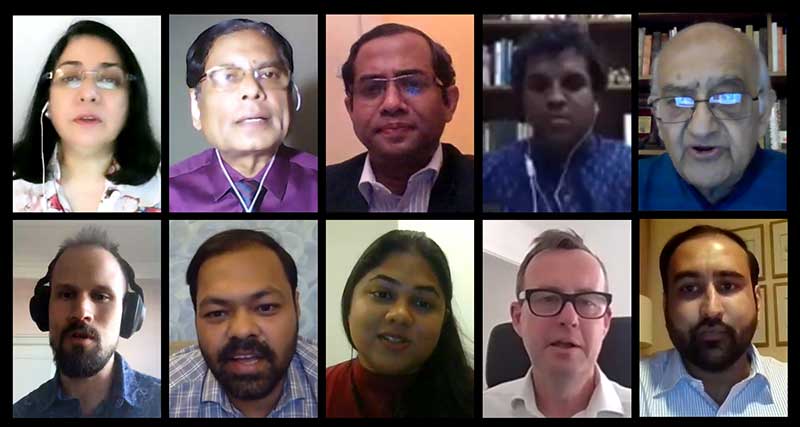The medium-term recovery of the global apparel value chain from the disruptions of the COVID-19 pandemic has been set back by the prolonged demand slump. Global imports of apparels during the period of January-August 2020 have contracted by 23% compared to the same period in 2019. Addressing medium-term challenges through national-level interventions alone will be difficult. Initiatives of major brands/buyers were limited to inventory smoothening, reshoring, and over-concentration of orders to a limited number of sources. The recovery of many supplying countries has been slow, including that of Bangladesh and Sri Lanka. Innovative ‘value- chain-based solutions’ are required to help all the market players cope with the crisis, ensure rebound and smooth recovery and ultimately make the value chain resilient.
These observations emerged at an International webinar titled Recovery of the Apparels Sector of Bangladesh and Sri Lanka: Is a Value-chain-based Solution Possible? The webinar was jointly organised by the Centre for Policy Dialogue (CPD) and the Institute of Policy Studies of Sri Lanka (IPS) in partnership with Southern Voice, which was held on Tuesday, 20 April 2021.

CPD’s Executive Director, Dr Fahmida Khatun, in her welcome remarks, shared that the CPD and IPS have recently conducted a joint study in collaboration with the Southern Voice to analyse the potential of a value-chain-based solution to support the recovery of the local apparel sector in view of the ongoing COVID-19 pandemic. She discussed how the pandemic has disrupted the global apparel value chain and shared that the study presents probable solutions to the challenges that have emerged for the apparel-supplying countries, particularly in Bangladesh and Sri Lanka.
In the keynote presentation, CPD’s Research Director, Dr Khondaker Golam Moazzem, and Mr Kithmina Hewage, Research Economist of IPS, stated that the study found that major sourcing countries have either reshored or over-concentrated to limited number of sourcing countries during the pandemic period. There is limited level of initiatives of major market players to keep the suppliers of major sourcing countries and the world of work in uncertainty to address the medium-term challenges. A major shift in the distribution of export orders by buyers during the COVID-19 period (January–June 2020) has deprived a number of major supplying countries, including Bangladesh and Sri Lanka. Analysis shows that an additional USD 2 billion worth of orders could be redistributed to supplying countries if the pre-COVID period’s market share of export orders is maintained in case of the largest supplying country – China. The study proposes that in case of a major global crisis, a redistributive approach should be maintained to ensure export orders at least at the pre-crisis level, particularly for countries that have fiscal constraints and weak social support programmes to support their suppliers and workers.
Mr Husni Salieh, Director, Strategic Transformation, MAS Holdings, Sri Lanka, also one of the distinguished panellists of the event, shared that the value of a value chain is truly optimised when its stakeholders work collaboratively particularly during the crisis. He also added that building resilience within a relatively diversified but existing value chain has the capability to face the current and future crisis successfully. The next distinguished panellists, Mr Mostafiz Uddin, Founder & CEO, Bangladesh Apparel Exchange, said that there is a lack of responsible business practices among the brands during the ongoing crisis. He opined that the brands should consider their suppliers as business partners and act responsibly. Ms Binu Wickramasinghe, Co-Founder & Managing Director, The Design Collective Store, Sri Lanka, as another panellist, stated that smaller enterprises, like their one, faced comparatively more difficulties during the crisis, particularly in accessing credit, adapting to the new normal. She also added the e-commerce was the biggest game-changer for them in coping with crisis. Another panellist, Mr Pierre Börjesson, Head of Sustainability – Global Production, H&M Group, said that the pandemic had shown the importance of acceleration of digitalisation in doing business. He also added that Bangladesh and Sri Lanka should consider how the market could be made more agile and flexible in terms of product diversification, services connected to the products and addressing the sustainability to achieving the possibility of trading higher than in the past. Finally, the panellist Mr Dan Rees, Director of Better Work, International Labour Organization (ILO), opined that only sector-specific measure might not address the existing challenges. He also added that to build strong resilience and protect the workers, trust and cooperation among the stakeholders and a long-term plan is required.
Professor Mustafizur Rahman, Distinguished Fellow, CPD, moderated the session. He stated that the study’s findings are crucial as all the stakeholders of the apparel value chain had been affected by the pandemic. He also said that, therefore, all the stakeholders have to play certain roles to find a solution that ensures the sustainability of the industry.
CPD’s Chairman, Professor Rehman Sobhan, said that ILO could consider playing an entrepreneurial role in bringing together international buying countries with supplying countries to restructure of global demand management. He further added that tripartite exercise should be carried out, including government, employers, and workers to produce a mutually accommodating system of unemployment insurance to address not just the immediate impact of the COVID crisis but a longer-term crisis. Mr M Syeduzzaman, Member, CPD Board of Trustees and Former Finance Minister was also present at the dialogue. The dialogue was also participated by relevant stakeholders, including a few key global apparels value-chain stakeholders, who shared their views on the recommendations of the study and media professionals.


